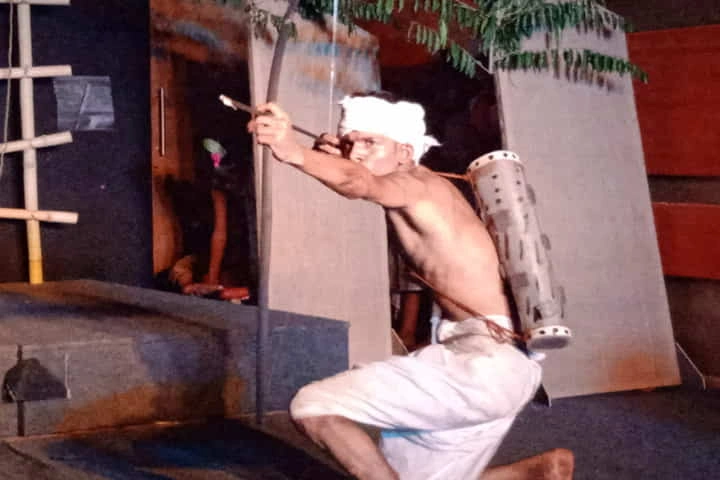The Sanskar Bharti Delhi staged its maiden play with a fine story and slick presentation on the occasion of Azadi Ka Amrit Mahotsav celebrations last week. The Hindi play “Ulgulan” or the Great Tumult is the story of the celebrated freedom fighter, Birsa Munda, who led his tribe, Mundas to fight against the British and landlords in Bengal Presidency in the late 19th Century, while asserting the inalienable rights of the indigenous people on their land and forest.
The 40-minute-long play touched all the vital aspects of Munda’s multi-faceted personality, who hailed from what is today’s Jharkhand. He rebelled against the injustice of the British and the zamindars, and conversion by Christian missionaries, while at same time exhorting his people to take care of their land, mountains, rivers and wildlife; follow hygienic practices like covering their food, keeping their villages clean, stop drinking liquor and believing in superstitions.

“Birsa was way ahead of his times, as he told Mundas not to pollute the rivers, safeguard their forests and wildlife, an environmental activist who also revolted against exploitation. His thoughts and actions are still relevant, as world over indigenous people are asserting their right to forest and their land,” remarked Rohit Tripathi, the seasoned director who helmed the production.
The cast included 35 children between eight to 15, all of whom reside in JJ localities of Kalyanpuri and Trilokpuri in East Delhi. Despite being greenhorns, all of them gave impeccable performance suffused with energy and enthusiasm. Tripathi, who chose them from a group of 100, made them undergo a 35-day workshop.
“Besides, narrating the story of Birsa Munda, we taught them acting, emoting, facial expressions, body movement, and dancing. We also told them about other aspects of theatre, like lighting and props, to give them a comprehensive feel of theatre,” disclosed Tripathi to India Narrative. He added that once the children understood what is expected of them, it was easy.

To provide a tempo to the proceedings, Tripathi included songs and dances in the play. “These reflect the tribal culture and were included to ensure that the story doesn’t become boring,” he revealed.
The hard work of the director, choreographer Tiara Tripathi, lighting in-charge Ravinder Mishra and music directors Chittaranjan Tripathi and Rajesh Pathak, was evident in the production, as it kept the large audience in rapt attention, who gave a standing ovation to the kids.
It was evident that this stage experience has done wonders to these youngsters, all of whom were brimming with confidence.

Special mention needs to be made about Vinay Kumar, who essayed Birsa’s role. A Class XII student, he has been a part of Rahul Tripathi’s group for the last five years and assists backstage. “I am looking forward to learning more about acting and stage and want to become an actor after my studies,” he told India Narrative.
The portrait of Birsa — who died at the young age of 24 on June 9, 1900, in Ranchi Jail where he was poisoned — hangs in the Parliament and he is the only tribal leader to enjoy this privilege. Born on November 15, 1875, the day has been declared as Janjatiya Gaurav Divas by the Union Government last year.














